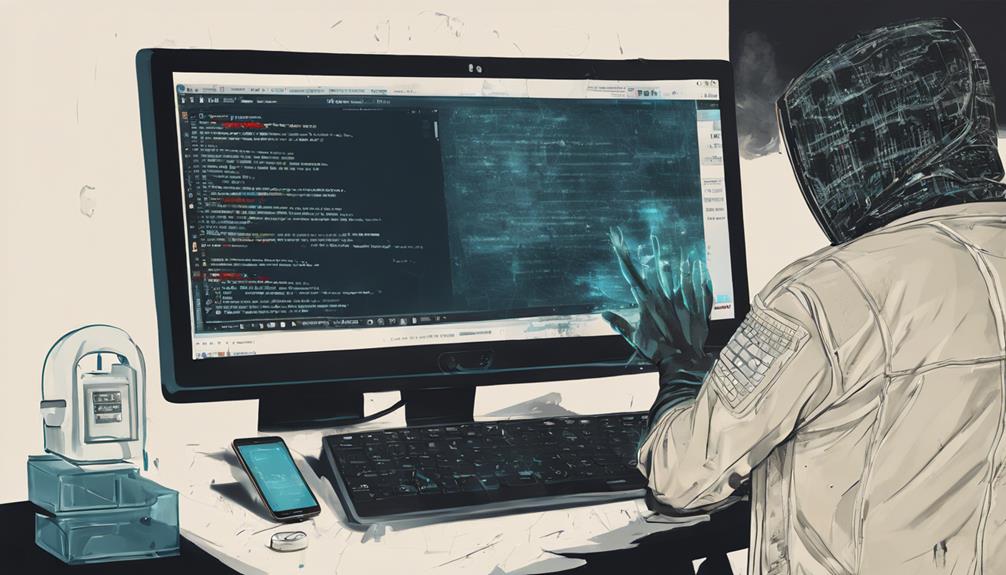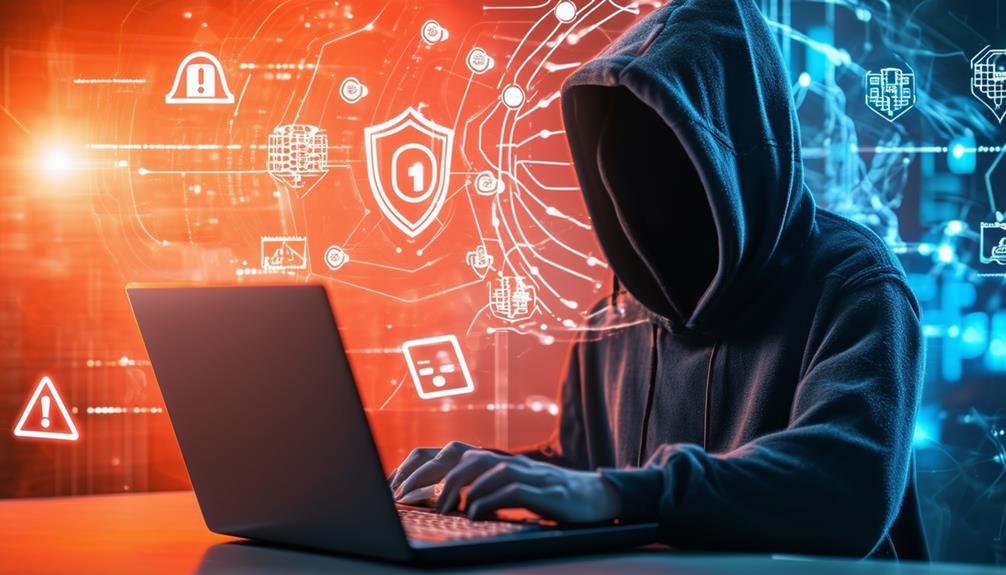Messenger utilizes end-to-end encryption and privacy measures to safeguard communications, yet vulnerabilities exist. Hackers exploit these weaknesses through system vulnerabilities and phishing attacks, compromising user data. Regularly updating the app and using strong, regularly updated passwords are vital security practices. Stay vigilant against phishing attempts and report suspicious activities. Enhance security by updating the app regularly, using secure Wi-Fi connections, and being aware of common threats. Protect personal data by reviewing privacy settings and using secure communication features. Messenger's defenses are robust with best practices, but ongoing vigilance is essential for thorough security protection.
Key Takeaways
- Messenger employs end-to-end encryption to protect messages from hackers.
- Regular updates and strong passwords enhance Messenger's security against unauthorized access.
- Phishing threats can compromise Messenger security; stay cautious and report suspicious activity.
- Utilize Messenger's secret conversations feature for enhanced privacy and protection.
- Stay informed about common security threats targeting Messenger users for proactive defense.
Messenger's End-to-End Encryption
Messenger's implementation of end-to-end encryption guarantees secure communication between users through its Secret Conversations feature. This advanced encryption method ensures that messages can only be read by the sender and the intended recipient, safeguarding your personal information from unauthorized access.
To benefit from this heightened security, users need to enable Secret Conversations for each chat individually, as encryption keys are stored solely on the devices involved in the conversation.
Vulnerabilities Exploited by Hackers

Given the increasing sophistication of cyber threats, it is imperative to address the vulnerabilities in Facebook Messenger that hackers exploit to compromise user security and privacy. Hackers often leverage weaknesses in Messenger's systems to gain unauthorized access, leading to data breaches and privacy violations. Phishing attempts, a prevalent tactic, specifically target Messenger users to extract sensitive login credentials and personal information. Additionally, the absence of end-to-end encryption in normal conversations on Messenger leaves them vulnerable to interception by malicious actors. These vulnerabilities create opportunities for hackers to exploit the platform, potentially resulting in severe consequences such as data breaches and unauthorized access to user accounts. The table below illustrates the key vulnerabilities exploited by hackers in Facebook Messenger:
| Vulnerability | Impact |
|---|---|
| System Vulnerabilities | Compromise user data and privacy |
| Phishing Attacks | Steal login credentials and personal information |
| Lack of Encryption | Susceptible to interception by hackers |
Importance of App Updates

Regular app updates are essential for ensuring the security of Messenger.
These updates often contain critical security patches that shield user data from potential breaches.
Neglecting to update the app can expose users to vulnerabilities that hackers may exploit, making it important to stay vigilant with updates.
Update for Security
App updates play an important role in strengthening security measures and shielding users from potential cyber threats when using messaging applications such as Messenger. Regular updates are vital for maintaining the security measures in place and protecting users' Facebook data from unauthorized access by hackers.
These updates often include security patches that address known vulnerabilities, reducing the risk of data breaches and ensuring a safer messaging environment. Failure to update the Messenger app can leave users exposed to security risks, making it easier for hackers to exploit weaknesses in older versions.
In addition to enhancing security, app updates also improve overall performance, introduce new features, and guarantee compatibility with the latest devices. By keeping Messenger updated, users take a proactive step towards safeguarding their personal information and enjoying a secure messaging experience.
Benefits of Updates
Enhancing Messenger's security through timely updates is essential for safeguarding user data and thwarting potential cyber threats. Regular app updates play a pivotal role in ensuring the protection of users' information within the Messenger platform.
Here are some benefits of staying updated:
- Fix Vulnerabilities: Updates address any weaknesses or bugs that hackers could exploit to gain unauthorized access to user data.
- Enhanced Security Features: New security features and patches are often included in updates to fortify the app's defenses and protect users' Facebook accounts.
- Prevention of Unauthorized Access: By updating Messenger, users can prevent unauthorized individuals from accessing their personal information and compromising their privacy.
- Defense Against Evolving Threats: Keeping Messenger updated is crucial to staying ahead of evolving hacking techniques and cyber threats that could potentially harm users.
Ensuring that Messenger is regularly updated is a proactive measure to maintain a secure environment for users and safeguard their online presence.
Strong Password Best Practices

Utilizing a strong and unique password is vital for enhancing the security of your Messenger account. When creating a password, it is important to follow best practices to safeguard your personal data on Facebook's Messenger platform. A strong password should be at least 8 characters long and contain a combination of letters, numbers, and special characters. Avoid using easily guessable information such as birthdays or common words to prevent unauthorized access. Regularly updating your password and refraining from sharing it with others are key steps in maintaining security. Additionally, enabling two-factor authentication (2FA) adds an extra layer of protection by requiring a verification code along with your password for access.
| Strong Password Best Practices | Details |
|---|---|
| Length | At least 8 characters |
| Complexity | Letters, numbers, special characters |
| Avoid | Birthdays, common words |
| Additional Security | Regular updates, not sharing, two-factor authentication |
Staying Cautious of Phishing Attempts

Users must remain vigilant against phishing attempts on Messenger to safeguard their personal data and prevent potential hacking incidents. Phishing attacks, a common tactic used by hackers, involve sending deceptive messages to users, aiming to trick them into revealing sensitive information such as passwords or financial details.
To stay cautious and protect against data breaches, here are some essential measures to follow:
- Think Before Clicking: Avoid clicking on suspicious links received through Messenger chats.
- Verify the Sender: Double-check the identity of the sender before sharing any personal information.
- Enable Two-Factor Authentication: Implement an extra layer of security to prevent unauthorized access to your account.
- Report Suspicious Activity: If you encounter any phishing attempts or suspicious behavior, report it to Messenger immediately to protect yourself and others from potential harm.
Enhancing Security Measures

To strengthen security in Messenger, it is important to implement a combination of encryption tools and additional security measures. Utilizing features like Facebook Secret Conversations for end-to-end encryption can enhance the protection of sensitive information shared on social media platforms.
However, it is essential to understand the limitations of such tools, such as the inability to send GIFs or make payments. In addition to encryption, opting for extra security layers like two-factor authentication can further safeguard your Messenger account from unauthorized access.
Regularly updating the Messenger app is also essential to make sure the latest security patches are in place, reducing the risk of vulnerabilities being exploited by hackers. Moreover, being cautious of phishing attempts and suspicious messages is necessary to maintain the integrity of your Messenger conversations and protect sensitive data from potential breaches.
Protecting Personal Information Online

Enhancing security measures in Messenger is pivotal for protecting personal information online, particularly in light of the risks associated with unauthorized access to stored data.
To safeguard personal information effectively, individuals should consider the following measures:
- Utilize strong and unique passwords to prevent unauthorized access to accounts.
- Enable two-factor authentication to add an extra layer of security to log-in credentials.
- Regularly review and update privacy settings to control the information shared with third parties.
- Avoid clicking on suspicious links or providing personal information to unknown sources to reduce the risk of data breaches.
Frequently Asked Questions
Can Hackers Hack Through Messenger?
Hackers may exploit vulnerabilities in Messenger, potentially gaining unauthorized access. Users should exercise caution when sharing sensitive information. Implementing additional security measures and understanding the platform's limitations can help mitigate the risk of hacking incidents.
Is Messenger a Security Risk?
Messenger presents security risks due to account hacking, phishing, and system vulnerabilities. Users are exposed to potential data breaches and privacy issues. Implementing measures such as spyware detection tools and end-to-end encryption can enhance security on Messenger.
What Are the Signs That Your Messenger Is Hacked?
Signs of a hacked Messenger account include unexplained messages, profile changes, unauthorized posts, login difficulties, and unrecognized devices accessing the account. Vigilance and prompt action are essential in addressing potential security breaches to safeguard personal information.
Can Someone Send You a Virus Through Messenger?
It is possible for individuals to send viruses through Messenger by exploiting vulnerabilities or using phishing tactics. Users should exercise caution, avoid clicking on unknown links, and employ security measures to mitigate this risk.
Conclusion
To sum up, safeguarding personal information on Messenger requires a combination of strong encryption, regular updates, and vigilant password practices. While vulnerabilities exist and hackers may attempt to exploit them, taking proactive security measures can help mitigate risks.
Remaining cautious of phishing attempts and enhancing overall security measures are essential in protecting sensitive data online. Remember, the digital world can be a dangerous place, but with the right precautions, you can navigate it safely.









